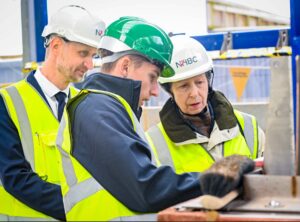Sustainability In Roofing Q & A

Russell Roof Tiles (RRT) manufacture concrete roof tiles and accessories used for both commercial and residential projects. As part of its commitment to NetZero2040 the company is enthusiastic about promoting the wider topic of sustainability to the construction sector.
The firm has three sites, two in Burton on Trent and one in Lochmaben (Scotland) and is the leading independent supplier of concrete derivatives for the UK pitched roofing market.
What sustainability initiatives do you consider when designing and manufacturing products?
Russell Roof Tiles’ products are all designed with sustainability in mind. Its large format concrete interlocking tiles are specifically designed to provide customers with a product that requires less fixings and fewer battens than small format clay alternatives, helping reduce overall material requirements on a roof.
The Russell Roof Tiles Natural Range builds on this further, reducing the thickness and weight of the tile and overall material content. It also ensures that tiles include the latest technology in lower carbon cements and aggregate mixes. The manufacturing process is inherently energy intensive, so Russell Roof Tiles have invested in multiple on-site renewable energy generation projects, as well as state-of-the-art curing facilities that reduce the energy demand. Owing to the natural make-up of the product, all of its tiles are able to be crushed and re-used as aggregate substitutes at the end of their useful life.
What should consumers be doing to maximise their sustainability efforts?
Where possible, Russell Roof Tiles encourages customers to opt for a Natural Range product due to the lower material content and increased quantity per pallet, meaning packaging is kept to a minimum. It is also beneficial to use all Russell Roof Tiles plastic dry fix products with its tiles, as the customer then benefits from a single delivery source, less risk of packaging cross-contamination from multiple suppliers and can rest assured that our products are manufactured using 100% renewable electricity. By planning ahead, customers can also order in full pallet quantities, and where possible full vehicle loads, which further reduces the need for excess packaging and reduces vehicle movements / visits to building sites.
Customers can also take advantage of a pallet return scheme, and bring back any wooden pallets used during delivery, to be re-used with future products.
How can products address sustainability and conservation concerns?
Advances in technology are making concrete roof tiles an ever more sustainable pitched roofing solution. Russell Roof Tiles recently launched its Net Zero 2040 pledge, with a roadmap of how it intends to reduce carbon emissions in its operations and the wider supply chain.
It actively engaged with suppliers to encourage energy reductions and sustainable practices and are rated as ‘Excellent’ under the BES 6001 certification for responsible sourcing. All of its manufacturing sites are covered by ISO 14001 approved environmental management systems, and we make a concerted effort to minimise our impact on the wider environment.
It has worked hard to source materials locally and was the first British roof tile manufacturer to have achieved an “Excellent” rating for responsible supplier sourcing. RRT is signed up to the SME Climate Hub, which is a government initiative aimed at getting SME businesses in the UK on the path to Net Zero. It has also achieved gold status with the Supply Chain Sustainability School, which is a multi-award-winning initiative that represents a common approach to addressing sustainability within supply chains.


